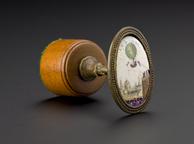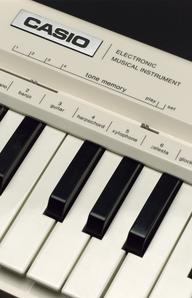

Joule's original calorimeter ('paddle-wheel apparatus') used in determining the mechanical equivalent of heat. Copper mixing vessel with vane and spindle
The British Scientist James Joule used this apparatus in his now classic paddle-wheel experiment. Falling weights turned the paddles to churn water; the churning raised the water's temperature slightly, and Joule found that the temperature rise was in direct proportion to the amount of work done by the falling weights. Joule's 'mechanical equivalent of heat' was crucial in developing the concept of energy.
Details
- Category:
- Heat
- Object Number:
- 1876-492
- Materials:
- copper and copper alloy
- Measurements:
-
overall: 700 x 210 mm (approximate)
- type:
- calorimeter
- credit:
- Dr. James Prescott Joule.




